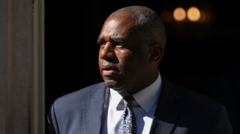Does Iran Still Have a Path to Diplomacy? Insights from Lammy

## Understanding the Current Tensions Between the UK, Iran, and the US: A Call for Diplomacy
As geopolitical tensions escalate, the recent developments surrounding Iran's nuclear program and military responses have captured global attention. Foreign Secretary David Lammy has made a compelling appeal for Iran to engage in diplomatic negotiations, urging the country to consider the "off-ramp" away from further conflict. This article delves into the implications of these tensions, the responses from UK leadership, and the broader context of international relations concerning nuclear proliferation.
### The Urgency of Diplomacy
In light of the US strikes targeting Iranian nuclear facilities—specifically Natanz, Isfahan, and Fordo—there is a pressing need for diplomatic engagement. Lammy's insistence on returning to negotiations reflects a broader consensus among Western allies that a military approach is not a sustainable solution. The stakes are high, as Lammy emphasized the potential for catastrophic consequences if Iran chooses to retaliate.
#### Key Points from Lammy's Address
- **"The Off-Ramp":** Lammy has highlighted the importance of finding a diplomatic solution. He contends that Iran must recognize the opportunity to de-escalate tensions and engage constructively.
- **Avoiding Escalation:** The Foreign Secretary warned against any retaliatory actions by Iran, such as attacking US bases or blockading the Strait of Hormuz, which could exacerbate the situation.
- **International Collaboration:** Lammy pointed out that the UK is not alone in this stance; collaboration with G7 partners, European nations, and Middle Eastern countries is crucial for a unified approach.
### The Legal and Moral Dimensions
When pressed about the legality of the US strikes, Lammy refrained from outright condemnation. He acknowledged the complex moral landscape, emphasizing that while the UK's stance on Russia's invasion of Ukraine remains clear, the situation with Iran presents different challenges.
#### Key Legal Considerations
- **Legitimacy of Action:** Lammy suggested that the US military action, while controversial, might be seen as legitimate under international law, considering the urgency posed by Iran's nuclear ambitions.
- **Diplomatic Failures:** The need for military action underscores the inadequacies of previous diplomatic efforts, as Iran continues to enrich uranium beyond acceptable levels, raising alarms about potential nuclear weapons development.
### The Threat of Nuclear Proliferation
A central concern in this discourse is the risk of nuclear proliferation in the Middle East. Lammy articulated a stark warning: if Iran succeeds in developing nuclear weapons, it could trigger a chain reaction, prompting neighboring countries to pursue their own nuclear capabilities.
#### Why Iran's Enrichment Matters
- **60% Enrichment:** Iran's current uranium enrichment levels, confirmed by the International Atomic Energy Agency (IAEA), raise significant concerns. Lammy questioned the justification for such high levels, implying that they are more indicative of weapons development than peaceful nuclear energy initiatives.
- **Monitoring and Accountability:** Lammy proposed that a civil nuclear program could be viable if it is subject to rigorous international monitoring. This could provide a framework for Iran to pursue nuclear energy while ensuring that it does not veer into weapons development.
### The Role of the UK and Allies
The UK’s position, as articulated by Prime Minister Keir Starmer and shadow defense secretary James Cartlidge, is one of support for US efforts while maintaining a cautious approach to military involvement.
#### Key Takeaways from UK Leadership
- **Support for Allies:** There is a clear message of solidarity with the US and Israel, highlighting the shared objective of preventing a nuclear-armed Iran.
- **Military Preparedness:** The UK’s decision to deploy military assets to the Middle East signals a readiness to respond if necessary, although officials remain cautious about direct involvement.
### The Broader Implications of Conflict
The ongoing tensions between Iran, the US, and European allies illustrate the complexities of international relations in a nuclear age. The intersection of diplomacy, military strategy, and national security interests creates a challenging landscape for policymakers.
#### Potential Outcomes of Escalation
- **Increased Hostility:** Retaliation from Iran could lead to a spiral of violence, undermining regional stability and prompting a broader military conflict.
- **Global Economic Impact:** The Strait of Hormuz is a critical shipping lane for global oil supplies. Any blockade or military action in this area could have severe repercussions on international trade and energy prices.
### Conclusion: The Path Forward
As the situation evolves, the emphasis on diplomatic solutions remains paramount. The call for Iran to return to the negotiating table is not merely a plea for peace but a necessary step to avert a potentially catastrophic outcome. The international community must rally around a unified approach that prioritizes dialogue over military action.
The question remains: How can global powers effectively engage Iran to ensure compliance with nuclear agreements while maintaining regional stability? The answer lies in a commitment to diplomacy, sustained pressure, and a willingness to explore innovative solutions that address the legitimate security concerns of all parties involved.
### FAQs
#### What are the main concerns regarding Iran's nuclear program?
Iran's nuclear program raises concerns about the potential development of nuclear weapons, leading to increased regional instability and the risk of nuclear proliferation.
#### Why is the Strait of Hormuz significant?
The Strait of Hormuz is a vital shipping route for oil, with a significant percentage of the world's oil supply passing through it. Any conflict in this area could disrupt global energy markets.
#### What diplomatic measures can be taken to address the situation?
Diplomatic measures may include renewed negotiations under the Joint Comprehensive Plan of Action (JCPOA), increased international monitoring, and incentives for Iran to comply with nuclear agreements.
The unfolding events surrounding Iran's nuclear ambitions command our attention and action. As global citizens, we must advocate for diplomatic solutions that prioritize peace and security. What do you think is the best way forward in addressing these complex international challenges? #IranNuclearDeal #Diplomacy #GlobalSecurity
Published: 2025-06-23 09:44:04 | Category: sport



